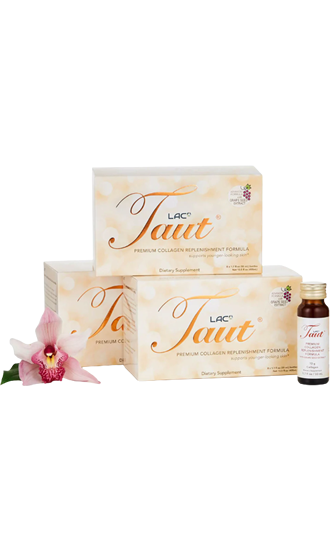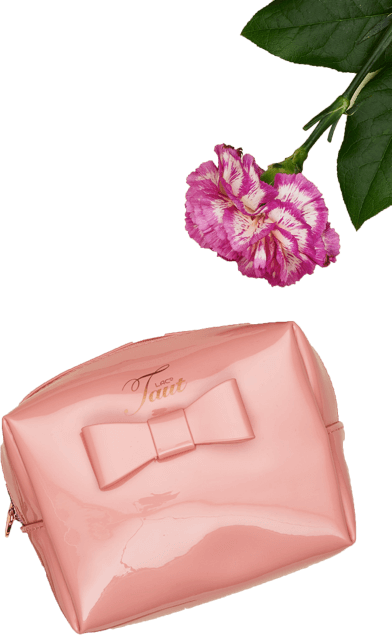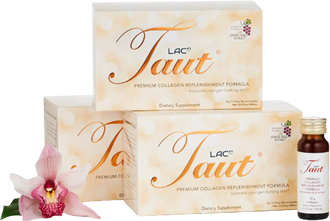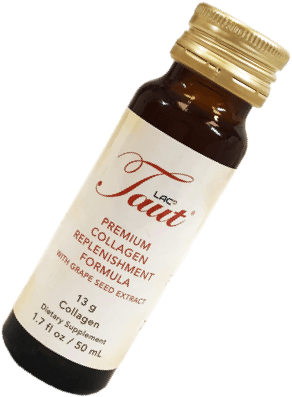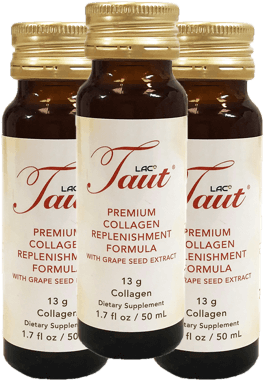Is Oat Milk Good for You? Top Health Benefits of This Dairy-Free Drink!
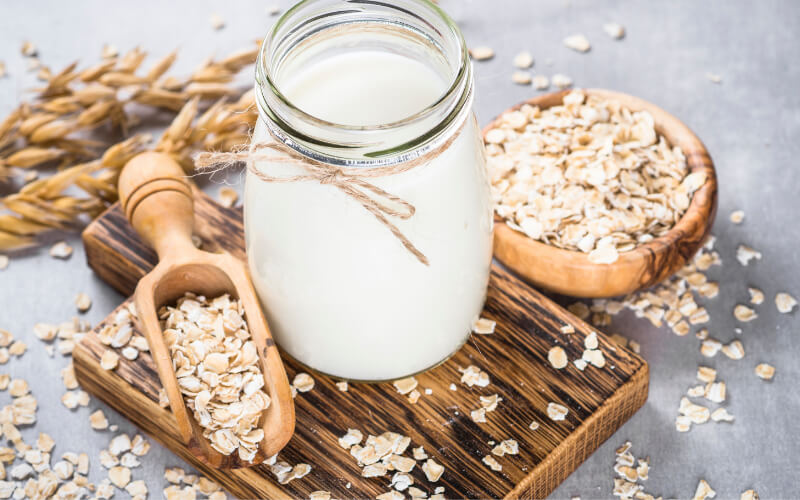
We all remember the ‘Got Milk?’ advertisements from the ‘90s and early 2000s. Everyone from Britney Spears and Beyonce to Jennifer Aniston encouraged us to drink cow’s milk all while smiling with that iconic milk mustache.
These campaigns, which were run by the Milk Processor Education Program (MilkPEP), were promoting cow’s milk as if it were essential to our health. It was supposed to be full of the vitamins and minerals that our bodies needed to get stronger and live a healthy life.
While I was growing up, it was common to have a glass of milk with every meal. I would pour it over cereal and dip chocolate chip cookies into it as an end-of-the-day treat. Ah, the simple things in life!
Now, however, many people are starting to limit the amount of cow’s milk they consume and question its health benefits. There are plenty of reasons to do so, including its perceived impact on inflammation, allergies, lactose intolerance, and the environmental impact and treatment of dairy cows in the industry.
While there is an increasing number of people that are ditching cow’s milk, there are also more and more people that are reaching for plant-based milk alternatives, such as soy, almond, hemp, rice, and coconut milk. Coincidence? We think not!
One new dairy-free milk that has been making waves in the wellness world is oat milk. Yes, the same oats that you use to make oatmeal can be turned into a creamy, delicious milk, too. In fact, oat milk sales grew 425% from 2017 to 2018. Even large coffee chains like Starbucks now have oat milk on the menu for people who want to add it to their morning java. 1
Are you tempted to swap oat milk for normal dairy milk? Not so fast. As with most health food trends, it’s important to do a little bit of research first before jumping on the bandwagon. As we’ve seen with other diet trends, what may seem like the healthier option may not actually be (we’re talking about you, low-fat diet).
To learn more about oat milk, we’ve gathered the most up-to-date information to find out the answer to the question “is oat milk good for you?” Keep reading to learn if milk made from oats is actually healthy, if it’s a better option than other plant-based milk alternatives, how you can make your own oat milk at home, and more.
What Is Oat Milk? (Dairy Free Milk)
Drinking a glass of oat milk is nothing like eating a big bowl of oats. It’s light, refreshing, and doesn’t weigh you down or fill you up like a classic morning bowl of oatmeal.
So, what is oat milk exactly? Oat milk is a plant-based milk alternative to cow’s milk made from, you guessed it, oats! When milk is made from oats, it has a surprisingly sweet flavor and thick, creamy consistency that is more similar to cow’s milk than other non-dairy milks. This milk-like texture is one of the main reasons why oat milk was quickly picked up by people following plant-based diets along with people who have celiac disease, gluten intolerance, or who are lactose intolerant. 1
However, not all oat milks are created equal. The taste and texture can depend on the brand you buy. While some oat milks can be rich and creamy, others can be thin and watery and leave you with a not-so-pleasant aftertaste. If you’re new to milk made from oats, we recommend trying a few different healthy brands and finding which one you like best! 1
How Is Oat Milk Made?
If you’re anything like us, the first time you heard about milk made from oats, you were probably wondering how it was made. And no, it’s not made by milking oats.
There are a few different ways to make oat milk, but most commercial oat milk brands start the process with whole groats, which are the whole-grain kernels of oats that still include the germ, bran, and endosperm. Milk made from oats can also be made of steel-cut oats, which are groats that have been toasted and cut into tiny pieces by steel blades. Using steel-cut oats can give the oat milk a slightly different, richer flavor. 1, 2
Similar to other non-dairy and plant-based milks, like almond milk and soy milk, commercial oat milk is made by soaking whole-grain oats in filtered water. Once the oats have been soaked in water for a sufficient amount of time, they are blended by a large machine until they are broken down into very small components. After the oats have been milled, the solids are then strained out, and the oat milk is what is left.
Most brands will then fortify the milk left from the oats with vitamins and nutrients before sterilizing the liquid and packaging it to be sold.
Is Oat Milk Healthy?
Considering that oat milk is the second most popular plant-based milk alternative (second to almond milk), you would think that it is a healthy alternative to cow’s milk. So, is oat milk good for you or has it grown in popularity sheerly because of its unique taste and texture? 3
The short answer is yes, oat milk does have its own set of health benefits. When it comes to nutritional value, oat milk contains a healthy amount of protein and fiber. Depending on the type of oat milk you choose, you can expect around 4 grams of protein and 3 grams of fiber per one-cup serving. Along with a high amount of protein and fiber, in one serving of oat milk you get about 35% of the recommended daily value of calcium and about 25% of the recommended daily value of vitamin D that you need.
Oats are also a rich source of vitamins and minerals like folate, magnesium, vitamin B, thiamin, manganese, phosphorus, zinc, and copper. Fortunately, these vitamins and nutrients are also extracted from oats when making oat milk. That means you can get a dose of each of these vitamins and minerals when you pour yourself a glass of oat milk.
In addition to the natural benefits of oats, some store-bought oat milk brands are fortified with vitamins and nutrients like calcium, vitamin B12, and riboflavin. 4
Want to learn more about the benefits of drinking oat milk? We discuss the top 3 benefits below:
1. Helps Lower Bad Cholesterol
Out with the bad and in with the good! Oats have been shown to help improve and maintain healthy levels of cholesterol due to their content of a soluble fiber called beta-glucan. One study looked at the benefits of beta-glucan and its effects on women and men with borderline high cholesterol. This study found that beta-glucan binds to cholesterol and prevents its absorption within the gut. Even though oat milk doesn’t contain whole oats, it still contains high amounts of beta-glucan, around 0.5g of beta-glucan per 100g of oat milk. 5, 6
2. Contains B Vitamins
Fortified, store-bought oat milk usually contains the B vitamins riboflavin (B2) and vitamin B12. These B vitamins have health benefits like the ability to minimize stress, strengthen skin, hair and nails, and neutralize free radicals. 7, 8, 9
If your aim is to support your hair, skin, and nails from free radical damage, including a strong antioxidant supplement, like LAC Masquelier’s French Pine Bark, into your morning or evening routine may be just what you need. Each tablet of this powerful vegan supplement can deliver anti-bacterial, anti-viral, anti-aging, anti-inflammatory, and anti-allergic properties to help protect, preserve and enhance your quality of life.
Things like a poor diet, pollution, stress, and too much sun exposure can cause free radicals to take over our systems and speed up the aging process. When we have too many free radicals in our body, we experience what is known as “oxidative stress.” This is when our cells become damaged and we experience weakened veins, deterioration of our eye health, and decreased skin elasticity.
French Pine Bark supplements act as a protector and vitamin for all of the systems within the human body. They are able to strengthen our capillaries to improve circulation and delay the aging process of our blood vessels, keeping our organs, muscles, and tissues, fed and powered by the vital nutrients from our blood.
This antioxidant supplement also gives us beauty benefits by protecting our collagen fibers from free-radical damage so we can maintain healthy collagen levels for much longer. In fact, Masquelier’s Original OPC’s have been clinically proven to protect against the deterioration of skin elastin and collagen, reducing the appearance of fine lines and wrinkles and improving our overall skin suppleness. 10
Integrating these small-yet-mighty tablets into your daily routine is easy. All you need is 1 to 2 tablets per day (1 tablet for every 100 pounds of your body weight) along with a glass of water, fruit juice, or oat milk!
3. Has Bone Health Benefits
Who knew that oat milk may also support healthy bones? It’s true! Fortified, store-bought oat milk that contains added calcium and vitamin D can promote strong bones.
Why does fortified oat milk contain both calcium and vitamin D? The truth is, we need vitamin D in order to absorb calcium. If we don’t have enough vitamin D, we aren’t able to form the hormone calcitriol which is what allows us to absorb calcium in our stomach from the food we eat. 11
Together, calcium and vitamin D keep our bones strong and prevent them from breaking.
A lack of these vitamins and minerals can lead to osteoporosis later in life. And, children who don’t get enough calcium and vitamin D in their youth may also develop a rare disease called rickets. Children with rickets experience weak and soft bones which easily break.Is Oat Milk Good For Weight Loss?
Nowadays, who doesn’t want to shed a few pounds? While drinking oat milk on its own will not help you lose fat on its own, including a cup of unsweetened oat milk, or any other alternative milk, along with a healthy diet can help you reach your nutritional needs.
For people who count calories, oat milk is a good option. One cup of oat milk only has around 130 calories. Besides being low in calories, it’s also low in fat, sugar (unsweetened brands, at least), and high in protein. It’s an especially good option for people who are leading a healthy lifestyle and need a lactose-free or nut-free milk option.
If you’re used to eating a bowl of cereal or drinking a latte in the morning, you’ll hardly notice replacing dairy milk with oat milk in those foods and beverages, and it can help you maintain a healthy weight.
What Are The Disadvantages of Oat Milk?
If oat milk is your plant-based milk of choice, there are only two things to consider before adding a splash of this alternative milk to your favorite foods and beverages:
1. Naturally High In Carbohydrates
Low-carb and keto diets are quickly growing in popularity for their wide range of health benefits and ability to promote weight loss. These diets limit carbohydrate and sugar consumption to very low amounts (hence the name) to keep blood sugar levels even and stable throughout the day, which has been shown to promote weight loss and have other anti-inflammatory effects. 12
While cow’s milk can be consumed in moderation on low-carbohydrate diets, many people often choose to drink alternative milks, such as almond milk, which is lower in carbohydrates than cow’s milk. They are also a popular choice for people who are lactose intolerant.
Is oat milk a good substitute for cow’s milk while on a low carbohydrate diet? While oat milk does have a little bit more protein and fiber than other alternative milks, it is also much higher in carbohydrates. Even if your preferred oat milk doesn’t contain any added sugar, it does contain carbohydrates which the body turns into sugar and uses as fuel. So, if you’re following a low-carbohydrate protocol, milk made from oats is not the best alternative to cow’s milk for your lifestyle and should be avoided, especially in large quantities.
If you’re wondering why oat milk isn’t ideal for a low-carb diet, it all boils down to the nutritional profile of oats. Oats are naturally high in carbohydrates which can raise blood sugar levels. A 1 cup serving of normal oatmeal has about 27 grams of carbohydrates and 3 grams of dietary fiber. A one cup of steel-cut oats (the less processed kind of oat) has about 29 grams of carbohydrates and 5 grams of dietary fiber.
While oat milk has fewer grams of carbohydrates when compared to a bowl of oats, it still high in carbohydrates. One serving of oat milk (one cup) can have 15 grams of carbohydrates, 3 grams of fiber, and 4 grams of protein.
The effects of oats on your blood sugar levels can be even more dramatic when the oats are in the form of oat milk. Since oat milk doesn’t contain any of the natural fiber from the grain, it’s easier for the body to break down the carbohydrates, raising blood sugar even higher.
Low carbohydrate diets are popular because they can help keep your blood sugar levels low and stable. However, since milk made from oats can cause your blood sugar to spike, it’s not the best option for people with PCOS, insulin resistance, or diabetes. A plant-based milk alternative, like almond milk or soy milk, is a better substitution for dairy milk for people following a low carbohydrate diet.
2. Not Always Certified Gluten-Free
Oats are one of the best grains for people with gluten intolerance or celiac disease, however, not all oats are certified gluten-free.
People with celiac disease have an immune reaction to gluten. Even the smallest amount of gluten can trigger an immune response which can lead to fatigue, anemia, weight loss, and other serious health issues. That is why people with celiac disease need to make sure all of the food they eat is completely gluten-free. 13
Although pure oats are naturally gluten-free, oats can easily become contaminated with gluten if they are processed or packaged in a facility that also processes other grains like wheat and barley. This slight contamination can turn gluten-free oats into grains that are not suitable for people with celiac disease. Any sort of contamination with gluten can disqualify oats and oat milk from being labeled as certified gluten-free.
While there are certified gluten-free oat milk brands, not all milks made from oats are certified gluten-free. Especially if you have gluten intolerance or celiac disease, you should not assume that all store-bought oat milk is gluten-free. It’s important to check the oat milk brands at your grocery store for one that is certified gluten-free. This indicates that the oats used to make the oat milk were certified gluten-free.
If you have gluten intolerance or celiac disease and prefer to make milk from oats at home, you’ll want to check that your oats are certified gluten-free.
3. Can Contain Glyphosate
We don’t mean to scare you, but according to a study by the Environmental Working Group (EWG), there is some evidence that the active ingredient in the weed killer Roundup, can be found in many oat-based foods. This ingredient, known as glyphosate, is considered a probable carcinogen by the International Agency for Research on Cancer. It also may impact your kidney, liver, and potentially, your ability to reproduce. Yikes! 14, 15
On the other hand, the U.S. Environmental Protection Agency (EPA) claims that glyphosate is not a cancer risk to people if used properly. Basically, the effects of glyphosate on human health are still up for debate. 16
So, does all milk made from oats contain glyphosate? The most basic answer we can give you is maybe, but there is a way to minimize your exposure to this potentially harmful chemical: Buy organic.
Buying organic milk made from oats is one of the best ways you can minimize your exposure to pesticides like glyphosate.
4. Can Be Costly
One of the downsides of oat milk is that it may be more expensive than traditional milk. If that is the case, making it at home might be a more affordable option. While it may contain less protein and will not be fortified with vitamins and nutrients, it is still a healthy milk alternative that’s low in calories and high in healthy fat and fiber. We’ve included a recipe down below so you can make your own healthy, oat milk at home!
Other Popular Plant-Based Milks
Besides oat milk, there are tons of alternative milk products out there that you can choose from. Some of the most popular types are soy milk, almond milk, and hemp milk, however, more recently you can find rice milk, coconut milk, cashew milk, macadamia nut milk, quinoa milk, and pea milk. What can’t you make milk out of?
Below, we’ll go over some of the other alternative milks that are available and what makes them unique.
Soy Milk
Soy milk was one of the first and most popular alternative milks available around the world. Soy milk is made from soy-beans, the same beans that are used to make tofu, soy sauce, and tempeh. Since these beans have a relatively high amount of protein per serving, soy milk also has a high protein content. Depending on which nutrition label you read, you’ll find that a serving of soy milk contains around 8 grams of protein.
Like other healthy nondairy, plant-based milks, soy milk is usually fortified with certain nutrients and vitamins like omega-3 fatty acids, vitamin D, and calcium. Along with protein, vitamins, and healthy fat, soy milk also contains flavonoids, which contain anti-inflammatory, antioxidant, and heart health properties.
One of the major health benefits that soy milk can provide is its anti-cancer properties, along with the ability to protect the body against cardiovascular disease and osteoporosis. We can thank the presence of isoflavones, like daidzein and genistein, for this major benefit. 17, 18
Almond Milk
Almond milk is one of the most popular alternatives to cow’s milk for people on a plant-based diet. It’s made by soaking ground almonds in water and straining out the remaining almond particles.
Almond milk gets its rich and creamy texture from its high content of healthy fats, since it contains both saturated and unsaturated fats. You can find unsweetened almond milk brands at your local food markets that have been fortified with vitamins and nutrients like vitamin D, calcium, and vitamin B12.
When it comes to the nutritional benefits of almond milk, you can expect around 4 grams of protein, 1 gram of fat, and 1 gram of carbohydrates in 100ml of fortified almond milk. When it comes to calories, most store-bought almond milks contain lower almond contents to make their calorie counts lower. If calories are not an issue for you, try making your own almond milk at home! 19, 20
Finally, if you have an allergy to tree nuts, you should avoid drinking almond milk.
Hemp Milk
Yes, we’re talking about that hemp. Hemp milk is made from hemp seeds. It has an earthy taste and a less-creamy texture than other non-dairy milks. One of the benefits of unsweetened hemp milk is that it won’t separate when added to hot drinks, making it a good replacement for dairy milk in coffee and tea. Gluten-free hemp milk is suitable for people with health issues like celiac disease and it is naturally lactose-free.
Hemp milk gets its nutritional value from little hemp seeds which contain high levels of polyunsaturated fats. These fats may help lower and maintain healthy cholesterol levels. Besides being beneficial for healthy cholesterol levels, hemp milk is also high in protein and calcium. This milk is naturally lower in calories which can help some people with weight loss, but it contains less protein than cow’s milk.
Rice Milk
Made by blending water with uncooked grains of rice, this mild-flavored milk is naturally sweet, but many brands add sugar to sweeten it up even further. Rice milk is a popular milk alternative for people with celiac disease and lactose intolerance. It’s also popular amongst people who want to avoid nuts and seeds. And, it is one of the alternative milks with the fewest amount of calories, making it a good alternative for people who are counting calories to lose weight.
Although, since it is made from rice this milk is one of the least healthy options available. While it doesn’t contain any gluten or lactose, it also doesn’t contain much fiber or protein. On the nutrition label of most rice milk drinks, you’ll find less than a gram of fiber and less than a gram of protein per cup. So, if you’re looking to replace milk with an alternative packed with healthy nutrients, this isn’t the best option.
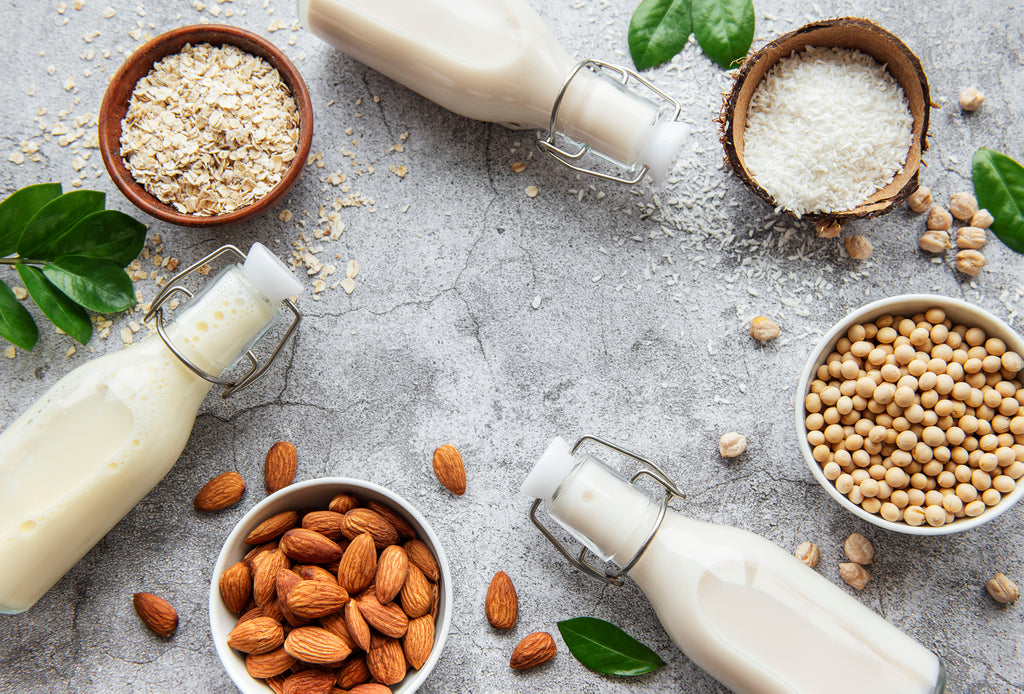
Milk Made From Oats Vs. Plant-Based Milk
Although experts agree that oat milk is healthy, it’s difficult to say whether or not it’s better or healthier than other milk alternatives, like almond milk. This is because each type of milk provides its own set of nutritional benefits and every person has different needs.
Openshaw believes milk made from oats is a superior choice over traditional cow’s milk, but recognizes that oat milk doesn’t offer the same nutritional value as other alternative milks. She explains that other plant-based milks, like almond milk and coconut milk, have more vitamins and minerals than milk made from oats, which means they can offer more health benefits. 1
Besides being naturally gluten-free and lactose-free, unsweetened almond milk, for example, contains high levels of vitamin E. Similar to oat milk, store-bought almond milk is often fortified with vitamins and minerals such as vitamin D and calcium, along with additional protein. When compared to unsweetened oat milk, unsweetened almond milk is also very low in carbohydrates and calories.
Additionally, one study showed that there was a correlation between people who regularly eat nuts in their diet and a reduced risk of heart disease. The heart health benefits come from the high amounts of healthy fats. Unsweetened almond milk contains around 1% of un-saturated fat. 21
Openshaw, however, warns that oat milk is a better option than soy milk. Although soy milk provides more protein than oat milk, it’s also known as an endocrine disruptor and usually contains GMOs. 1
One area where oat milk takes the lead over other plant-based milks is the number of grams of fiber. Oat milk can provide up to 3 grams of fiber per serving, which is significantly more when compared to other plant-based milks, which often have less than one gram of fiber per serving.
Oat Milk Vs. Cow’s Milk
We all want to know what is better for us: Oat milk or cow’s milk?
Some experts argue that cow’s milk may offer more benefits than oat milk because dairy milk is a good source of protein, without having to be fortified. Oat milk contains significantly less protein than cow’s milk per serving. While cow’s milk provides around 8 grams of protein per serving, oat milk only contains about 4 grams of protein per serving.
Besides the high number of grams of protein that cow’s milk offers, it is also a good source of calcium, a nutrient that is essential for healthy bones. Cow’s milk offers around 275 grams of calcium per serving, while oat milk doesn’t contain any calcium, unless it is store-bought. Store-bought, fortified oat milk can contain up to 350mg of calcium per serving. 22
Cow’s milk also naturally contains vitamins and nutrients like vitamin B12 and iodine, which are necessary for optimal bone health and muscle function. And, here in the United States, dairy milk is often fortified with vitamin D. Some research points out that sufficient sun exposure can provide the same recommended daily value of vitamin D as cow’s milk. 22
Finally, dairy milk products contain whey and casein, which have been linked to lowering blood pressure. 22
One nutrient that cow’s milk lacks is fiber. Cow’s milk contains zero grams of fiber. Oat milk, on the other hand, can contain up to 3 grams of fiber per serving. Fiber is essential for optimal heart health and can help us maintain healthy levels of cholesterol due to the cholesterol-lowering hormone beta-glucan. One study found that men who drank three glasses of oat milk for five weeks had lower serum and LDL cholesterol levels. 1
Another one of the benefits of oat milk is that it is lactose-free and contains un-saturated fat as opposed to saturated fat. While cow’s milk contains both lactose and saturated fat, some studies show that saturated fat may not be such a bad thing. 23
There’s one big reason to choose oat milk over cow’s milk and it has to do with the environment. Oat milk is eco-friendly when it comes to ethical concerns regarding farming, especially in comparison to dairy milk. Oat milk has a much smaller carbon footprint, meaning that farming and making oat milk releases significantly less carbon dioxide into the atmosphere than farming and processing cow’s milk. 1
For example, if you’re a vegan, drinking fortified, store-bought oat milk can be beneficial because it often contains vitamin B12, a vitamin that vegans do not generally get enough of in their normal diet. Some store-bought brands contain up to 50% of the recommended daily value needed per serving. Plus, no cows were harmed in the making of your beverage.
In the end, the best and healthiest milk option depends on the individual’s taste preferences, nutritional needs, medical history, allergies, and personal values.
Oat Milk & Skin (Is Dairy Milk Bad For Skin?)
Along with the boom in plant-based milk alternatives (oat milk included), there has also been a drastic decrease in the consumption of dairy milk and products. One of the reasons for this huge reduction in dairy milk consumption has to do with its link to worsening skin health.
Dairy consumption has been tied to increased breakouts. However, according to the American Academy of Dermatology Association, the research supporting the connection between dairy milk and acne is weak and more studies are needed to come to a conclusion. 24
You can avoid this issue altogether by choosing oat milk and other non-dairy milks like almond, oat, and soy milk over dairy milk products.
Regardless of which non-dairy milk you choose, if you’re worried about skin blemishes, it’s important to find milk that doesn’t contain any added sugars. Besides sugar’s ability to speed up the aging process, eating sugar has also been tied to developing acne. According to the American Academy of Dermatology Association, eating a low-glycemic (low in sugar) can be beneficial for those of us with breakout-prone skin.
How is sugar bad for your skin? When we eat or drink something that contains sugar, it causes our blood sugar to spike and high blood sugar can cause inflammation throughout the body. As a result of the inflammation, our body creates more sebum, which is the oil found on our skin. When we experience increased sebum, our pores can become clogged, which can lead to breakouts. That’s why skipping sugar-filled plant-based milk products is a must if your goal is to achieve beautiful, clear skin. 25
Since everyone is different, we can’t tell you which milk will or will not lead to breakouts, but we can suggest adding a collagen supplement to improve your skin from within. A powdered supplement, like Taut Collagen Powder, makes adding collagen to your diet a breeze, especially if you’re always on the go.
It contains 1,500mg of marine collagen peptides to support skin firmness and moisture, while protecting against free radical damage and premature aging. Although it tastes sweet, it doesn’t contain any added sugar, it is sweetened with stevia and tastes like juicy, ripe cranberries.
Along with collagen, the sachets contain hyaluronic acid, a plant-derived “moisture magnet” that can hold more water than any other polymer and drastically improve the skin’s moisture content, along with grape seed extract, to protect the skin and its collagen from free radicals.
Best of all – this beauty supplement is designed for today’s modern woman; it can be taken anywhere! Although many women mix a sachet or two into a glass of water, it can also be dissolved right on the tongue thanks to its quick-dissolving formula. Grab a few sachets and keep them in your car, your purse, or gym bag to support your skin health no matter where you are!
Can Babies & Children Consume Oat Milk?
Before serving babies and children a large glass of oat milk, it’s best to consult with a pediatrician first to know whether or not oat milk will be good for them. Generally speaking, babies under the age of one should avoid oat milk since their immune system isn’t fully developed.
What’s especially important to note is that oat milk is not an adequate replacement for breastmilk. Breast milk is best for the child in regards to both growth and development. Once the child is a bit older, you can then introduce a small quantity of oat milk first and see if they can tolerate it.
If you’re looking for a nut-free, plant-based alternative milk for your child that’s over the age of 5, oat milk is a good choice. While at your local grocery store, look for an oat milk brand that has been fortified with calcium and vitamin B12. And, if you’re worried about any allergies or health issues like celiac disease, it’s always best to speak with your child’s pediatrician.
Choosing The Best Oat Milk For You
Lucky for us, oat milk’s growing popularity means that it's fairly easy to find in many grocery stores or even online. When you’re shopping for oat milk, make sure to always check the nutrition facts on the back of the label to be sure that you’re buying a product that will support your health and wellness goals. After all, if you’re switching to oat milk from cow’s milk, it would be silly to choose a plant-based milk that is full of sub-par ingredients.
Wondering what to keep an eye out for while buying oat milk? We’ve put together a list of the four things to look out for on the nutrition label when shopping for oat milk.
1. No Added Sugar
We’re all learning how harmful added sugars can be to our health and our body. Too much added sugar can lead to health issues like heart disease, cancer, type 2 diabetes, tooth decay, and other issues like oxidative stress. One way to reduce our daily sugar intake is by choosing unsweetened oat milk free of added sugars.
Not only can added sugar affect our overall health, it can also impact our beauty. Eating too much sugar can lead to oxidative stress, a situation caused by the overabundance of free radicals in the body. When we have too many free radicals roaming around, they can attack the cells in our health tissues, causing premature aging.
Collagen and elastin, which are the two proteins that keep our skin bouncy, youthful, and radiant, are excellent targets for free radicals. When our collagen levels decrease, we notice an increase in wrinkles, fine lines, and sagging skin. While we can lean on antioxidants to counteract the harmful damage of free radicals, we also need to support our collagen levels and restore what we have lost. 27
Taking a supplement that was specifically designed to transform and protect your skin, like Taut Liquid Collagen Drink, can give your skin maximum rejuvenation and faster, visible, long-lasting results.
This potent liquid collagen drink doesn’t contain just any collagen. Normal collagen molecules in their native state are too large to be absorbed by the body. Unlike many collagen supplements on the market, our supplement’s unique formula contains collagen molecules that have gone through a revolutionary patented process called hydrolysis, which breaks down collagen molecules into smaller, nano-sized molecules called collagen peptides. A small bottle of our delicious drink contains 13,000mg of hydrolyzed collagen peptides that have been sourced from red snapper fish which was caught in the Indian Ocean.
When you take a sip of this delicious, orange-flavored drink, your body automatically detects the high concentration of collagen peptides and triggers its own, natural wound-repair response. As a result, the specialized cells in your skin start to rapidly produce collagen, filling in fine lines and wrinkles, lifting and tightening sagging skin, and increasing hydration and firmness within the dermis.
To further enhance your skin, our drink contains nutrients and antioxidants like hyaluronic acid and ceramides to improve the skin’s moisture content, grape seed extract, and vitamin C to protect the skin from free radicals that have formed at a cellular level, and vitamin B6 to relieve stress and tension.
Ready to give our collagen supplement a chance to revive your skin? For first-time users, we recommend drinking 1 bottle of Taut Premium Collagen every day before bedtime or at least two hours after eating every day for a minimum of 3 weeks.
2. Organic & Free of Harmful Ingredients
When it comes to choosing most things in the grocery store, organic is often best—especially when you’re shopping for oat milk. As we mentioned above, organic oat milk is less likely to contain high levels of glyphosate, making it a much safer option when compared to non-organic oat milk made from conventional oats.
Just because a product is organic, doesn’t mean that it’s healthy. That means that even if your oat milk is organic, it’s important to turn the bottle around and look at the ingredients listed on the nutrition label. The best brands of oat milk only contain a handful of ingredients: Organic oats, water, and salt.
Many oat milk brands contain additives like emulsifiers that can improve the milk’s shelf life, along with its overall texture. While this may sound like a good thing, Openshaw explains that these ingredients can also negatively affect the bacteria in your gut microbiome and have been shown to cause low amounts of inflammation which can lead to inflammatory bowel disease (IBS) and metabolic syndrome. 1
3. Avoid “Barista” Versions of Oat Milk
If you’re planning on mixing oat milk with your coffee as a replacement for creamer, we recommend avoiding store-bought oat milks that are intended for coffee shops. While these specially-formulated oat milks are not harmful to drink every now and again, from a health perspective, they are not ideal for everyday consumption.
What makes “barista” varieties different from normal oat milk? These formulas contain added oils, like sunflower oil or safflower oil, which allow it to be steamed and frothed more easily. While these oils come from plant sources, they are not necessarily healthy. Sunflower and safflower oil are both high in omega-6 fatty acids and eating and drinking too much of these oils can cause an imbalance within the body. Openshaw adds that rapeseed oil is commonly found in store-bought oat milks, which can contain high levels of erucic acid, a chemical that has been tied to cardiovascular damage. 1
Eating too much of these oils can cause you to experience high levels of inflammation, which can lead to a whole host of negative health effects including arthritis, asthma, atherosclerosis, cancer, diabetes, and more. 27
4. Bad Flavor
Besides the ingredient list, the other thing to take into account when shopping for the right oat milk is taste. It has to taste good in order for you and your family to actually drink it. We recommend trying a few different brands until you find one that you like, but remember to always check the nutrition labels. Sometimes the tastiest option isn’t always the healthiest one.
How to Make Homemade Oat Milk
If you want something done right, make it yourself! Although buying your oat milk at the grocery store is easy and convenient, it can get pricey. If you want to ensure the purity of your oat milk, the best thing you can do is make it yourself. It’s actually very easy to do and you’ll have the added peace of mind knowing that there is no excess sugar, preservatives, additives, or thickeners added in. When you make your own oat milk you can be sure that it is completely gluten-free.
There is, however, one downside to making your own oat milk, but it’s not a deal-breaker. By making your own oat milk at home, you won’t get the benefits of fortification, meaning you could be missing out on an extra dose of nutrients like calcium and vitamin D. But all in all, making your own oat milk is still the best and healthiest option. We promise it will taste delicious, too!
Oat Milk In 4 Simple Steps
Ready to try your hand at homemade oat milk? It doesn’t take long and can be made days in advance. To get started, you’ll need:
- Organic oats
- Filtered water
- Blender
- Cheesecloth, nut milk bag, or thin kitchen towel
Once you have all of these ingredients and tools, follow these four simple steps:
- To make your oat milk, soaking one cup of organic oats in one cup of water for 30 minutes.
- Next put the soaked oats into a blender along with three additional cups of water and a pinch of salt if you’d like. You can use less water if you want a creamier texture.
- Then blend for about one minute.
- Lastly, you need to strain the mixture once or twice (depending on your desired consistency) using a thin towel, cheesecloth, or a nut milk bag.
Once you have strained your oat milk, you’re ready to take your first sip. However, you can always take your homemade oat milk to the next level by blending in a pitted date or a handful of berries, adding a splash of vanilla extract or cinnamon, or mixing in some honey or maple syrup. 1
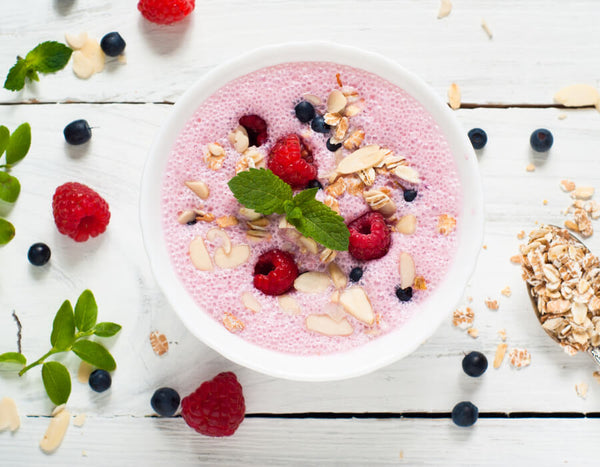
How to Use Oat Milk
When your oat milk is to your liking, you can drink it up on its own either warm, cold, or room temperature for a tasty, nutritional boost at any time of the day. Although you don’t have to drink oat milk on its own to get all of the health benefits—there are so many different ways you can incorporate it into your diet.
Our favorite way to get the health benefits of oat milk is by adding a splash of it to our freshly brewed morning coffee and tea. Oat milk is also a great substitute for cow’s milk in smoothies, hot chocolate, and cereal. You can even make ice cream out of oat milk. The possibilities are endless!
If you don’t want to have your oat milk right away, you can store it in the refrigerator. If it’s stored in a properly sealed container, it can stay in the refrigerator for up to 5 days.
Making The Healthy Choice Is Easy With Taut
The bottom line is, oat milk is a great alternative to cow’s milk or other plant-based milks, especially for those that can’t have lactose, gluten, soy, or nuts. It’s full of vitamins A and D, healthy carbohydrates, iron, potassium, calcium, and has more fiber than other milk alternatives. The fact that it has a delicious and creamy taste just makes it that much better. At the end of the day, it all comes down to preference and what is right for your health.
Regardless of which type of milk products you decide to use, we strongly believe that taking care of your skin and body’s health comes from within. While making healthy choices throughout our life can be difficult at times, choosing collagen products that support our skin and body doesn’t have to be. We developed our Ms. Magnifique Transformation Program for exactly that reason—to make hard choices, easy.
This skincare program combines some of our most synergistic products to take your skin from drab to glam in just a few weeks. This skincare program comes with 3 boxes of our best-selling Taut Premium Collagen Drink Advanced Formula, which rejuvenates our skin from within with the building-block to youthful, radiant skin: Collagen. Each bottle of our liquid collagen drink contains 13,000mg of hydrolyzed marine collagen harvested from wild-caught red snapper fish from the Indian Ocean. Along with highly bioavailable collagen, this unique formula contains hyaluronic acid, grape seed extract, vitamin C, salmon DNA, ceramides, and vitamin B6. Altogether, this combination of effective ingredients helps promote your body’s own defenses against premature aging so you can restore beautiful-looking skin.
Along with a 21-day supply of Taut Liquid Collagen, this transformation bundle also comes with one box of Taut Bright Bye-Bye Dark Spots, our skin brightening supplement. Age spots, uneven skin tone, and hyperpigmentation due to stress, aging, sun, and pollutants will become a thing of the past. These skin imperfections are all natural signs from the body that toxic waste from excessive free radical damage has accumulated inside of our body, especially within our liver.
Instead of treating this damage from the outside, this supplement gets down to the root causes of the problem by providing the skin with 7 key ingredients (glutathione, L-cysteine, olive leaf extract, artichoke leaf extract, grape seed extract, alpha-lipoic acid, and vitamin C) to minimize cellular damage and control the excess production of aging pigments from within.
One tablet per day helps detoxify and protect the cells from free radical damage and oxidative stress, cleanse the liver, nourish the skin, repair and reduce cell degeneration, and stimulate collagen production for bright, clear, and glowing skin.
We all know that the skin needs a pick-me-up every so often, which is why we’ve included one box of our Taut Collagen Mask. This collagen peptide-infused face mask is formulated to bring sagging, dehydrated, and dull-looking back to life. In just 15 to 20 minutes, the hydrolyzed collagen peptides, hyaluronic acid, squalene, and vitamin C hydrate, nourish, and plump the skin. It’s the perfect solution for those days when your skin is asking for a boost.
References
- Oat Milk Is At Starbucks (And Everywhere Else)–Is It Really That Great?
- What Are Groats?
- Oat milk surges to second most popular in plant-based dairy
- How Healthy is Oat Milk?
- Oat β-Glucan Beverage Lowers LDL Cholesterol and Cardiovascular Risk in Adults with Borderline High Cholesterol: A Double-Blind RCT
- 5-Week Oat Milk Consumption Lowers Serum and LDL Cholesterol in Men with Moderate Hypercholesterolemia
- Hair, Nails, and Skin: Differentiating Cutaneous Manifestations of Micronutrient Deficiency
- Riboflavin Has Neuroprotective Potential: Focus on Parkinson's Disease and Migraine
- B Vitamin Supplementation and Its Effects on Depression, Anxiety, and Stress: A Systematic Review and Meta-Analysis
- Bone Health and Osteoporosis
- A low carb diet for beginners
- Celiac disease
- Roundup for Breakfast, Part 2: In New Tests, Weed Killer Found in All Kids’ Cereals Sampled
- Glyphosate Herbicides and Your Health
- How well do plant based alternatives fare nutritionally compared to cow’s milk?
- Soybean foods and their benefits: potential mechanisms of action
- Vegetarian and Vegan Diets: Health Outcomes from a Systematic Review and Meta-Analysis of Observational Studies
- Top 5 health benefits of almond milk
- Nuts and Cardio-Metabolic Disease: A Review of Meta-Analyses
- Is it better to drink cow’s milk or a dairy-free alternative?



